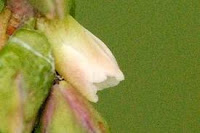Water pepper is Culpeper’s hot arssmart and the seeds of this plant are said to taste similar to Sichuan
 Water pepper is native to
Water pepper is native to  Rutin is known to strengthen the capillaries, so helping to prevent bleeding. The plant has been traditionally used in Eastern and Western folk medicine for a number of ailments including epilepsy when used with other tonics and gum myrrh, and a cold water infusion with one ounce of the herb to one pint of water mixed with plantain (isphagol) or wheat bran has been used for bowel complaints. The cold water infusion has been used to disperse gravel in the organs although it is not recommended these days for this treatment because of the oxalic acid present in some plants in the Polygonum family.
Rutin is known to strengthen the capillaries, so helping to prevent bleeding. The plant has been traditionally used in Eastern and Western folk medicine for a number of ailments including epilepsy when used with other tonics and gum myrrh, and a cold water infusion with one ounce of the herb to one pint of water mixed with plantain (isphagol) or wheat bran has been used for bowel complaints. The cold water infusion has been used to disperse gravel in the organs although it is not recommended these days for this treatment because of the oxalic acid present in some plants in the Polygonum family. In North America a hot decoction of water pepper was used for cholera patients, with a sheet being soaked in the decoction and then wrapped around the patient. The fomented leaves were once used in poultices for ulcers and piles. (Perhaps giving rise to the word Ars-smart!) Simmered in water or vinegar the resulting liquid was used to prevent gangrene spreading.
According to a recent Chinese study water pepper was 20th in a list of plants which could have potential as contraceptives. Other studies have found that it has antioxidant flavonoids in its leaves, and also has anti-inflammatory properties. It is also a useful astringent and styptic, so is a good wound healer and encourages damaged tissue to heal. The plant has also been used as a diuretic, for troublesome periods, and the seeds are said to be stimulants and they also help with flatulence.
Culpeper writing in the 17th century has this to say about water pepper:-
“The hot Arssmart is called also water-peper, or culrage….that which is hot and biting, is under the dominion of Mars…
It is of a cooling and drying quality and very effectual for putrified ulcers in man or beast, to kill worms and cleanse the putrified places. The juice thereof dropped in, or otherwise applied, consumeth all cold swellings, and dissolveth the congealed blood of bruises by strokes, falls, &c. A piece of the root, or some of the seeds bruised, and held to an aching-tooth, taketh away the pain. The leaves bruised and laid to the joint that hath a felon thereon taketh it away. The juice destroyeth worms in the ears, being dropped into them; if the hot Arssmart be strewed in a chamber, it will soon kill all the fleas; and the herb or juice of the cold Arssmart, put to a horse or other cattle's sores, will drive away the fly in the hottest time of summer; a good handful of the hot biting Arssmart put under a horse's saddle, will make him travel the better, although he were half tired before…
 The hot Arssmart groweth not so high or tall as the mild doth, but hath many leaves of the colour of peach leaves, very seldom or never spotted; in other particulars it is like the former, but may easily be known from it, if you but be pleased to break a leaf of it cross your tongue for the hot will make your tongue to smart, so will not the cold. If you see them both together, you may easily distinguish them, because the mild hath far broader leaves…”
The hot Arssmart groweth not so high or tall as the mild doth, but hath many leaves of the colour of peach leaves, very seldom or never spotted; in other particulars it is like the former, but may easily be known from it, if you but be pleased to break a leaf of it cross your tongue for the hot will make your tongue to smart, so will not the cold. If you see them both together, you may easily distinguish them, because the mild hath far broader leaves…” Doctor William Salmon, another 17th century herbalist wrote this of water pepper:-
“It is known by manifold and large experience to be a peculiar plant against gravel and stone. The Essence causes a good digestion, it is admirable against all cold and moist diseases of the brain and nerves, etc., such as falling sickness, vertigo, lethargy, apoplexy, palsy, megrim, etc., and made into a syrup with honey it is a good pectoral. The oil dissolves and discusses all cold swellings, scrofulous and scirrhous tumours, quinsies, congealed blood, pleurisies, etc.”
It was clearly well-used in former times, and also mentioned in the first century A.D. by Dioscorides.





No comments:
Post a Comment